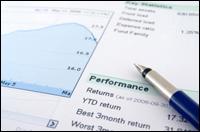 It’s the end of one investment year, the beginning of another. Every year, the same questions always come up to me: How do I position myself as smartly as possible for the coming year? What steps do I need to take to reapportion my stock portfolio so as to maximize what the next, new year has in store (as far as anyone can intelligently predict, that is)?
It’s the end of one investment year, the beginning of another. Every year, the same questions always come up to me: How do I position myself as smartly as possible for the coming year? What steps do I need to take to reapportion my stock portfolio so as to maximize what the next, new year has in store (as far as anyone can intelligently predict, that is)?
So let’s do this today: if you have a list of the stocks in your portfolio (and hopefully you keep some kind of spreadsheet record of them), get the list out and use it to check against what I’m going to tell you in this article.
First of all, how many stocks do you own in this portfolio? This is a basic question to ask each year, as sometimes we find ourselves adding to the portfolio and not selling off anything, which leads to us becoming so encumbered by the number of stocks to keep track of. My recommendation is for you to have no more than ten stocks in your portfolio, and perhaps five or six would be even more manageable if time and attention is a problem for you.
Secondly, if you have too many stocks, which one(s) do you sell off at the beginning of a new year? My recommendation is for you to make a list of the well-performing stocks from the previous year. If you are in profits, how long have you owned the stock? Would you be subject to short-term or long-term capital gains on the profit? (Keep in mind that for most of us, the tax consequences of profit in one stock are not very significant, so don’t let taxes be the sole basis of your decision as to whether or not to keep a stock in your portfolio.) However, I like to include this information about tax consequences because I know there are people out there reading this who do want to take into consideration whether or not profit in a stock sale would increase their taxes for the previous year.
Another reason to sell off a stock or stocks that actually made money is, after doing some good, basic research, you have discovered the fundamentals of the company (or its sector or the environment) have changed. In this case, there is a strong possibility the stock will not do as well in the new year as it has in the past. Keeping profitable stocks is never a foolish thing to do when you have a winner in your portfolio. But beware! Don’t track a stock after you sell it (and have made good money on it), it might lead to despair; if the stock continues to rise, you may find yourself wishing you had kept it. Don’t do this! Move on once you sell it, whether it goes up or down.
You might sell just because you want to keep your portfolio more fluid, not settling in with certain stocks for the long haul. The days of buying and holding the stocks forever are gone. You are not married to anything you own in your portfolio, and it is solely up to you when you decide to sell. The end of a year is a good time to do this; like a New Year’s resolution, it starts you off with a clean slate for the future.
Now the flip side of the profit coin is that you may decide to sell a poor-performing stock from the year. This is called “cutting your losses.” If the research you do indicates there is no reason for the stock or its company to do any better in the coming year, then why hold on to it? It was a “mistake” to buy it — so sell it. No use crying over stock losers. This only breeds defeat and discouragement. Instead, look at it as cleaning house, throwing away what doesn’t work for you and putting into your portfolio a stock that could be a big winner in the coming year.
If you’re like me, you might like to track the performance of your stock portfolio in the coming year. In order to do this, capture the value of the portfolio as of the close of the stock market on the last day of the year, put it somewhere into the spreadsheet, and then you can see how your stocks perform during the new year.
Remember if you add new money during the new year to this portfolio, it will distort the percentage of profit or loss. So when you do the math on this, remember to subtract the new money amounts you put in.
Starting fresh is always good, whether it’s with a stock portfolio or anything else for the new year. I hope this will give you some incentive to make 2008 a year of investment know-how for you.
